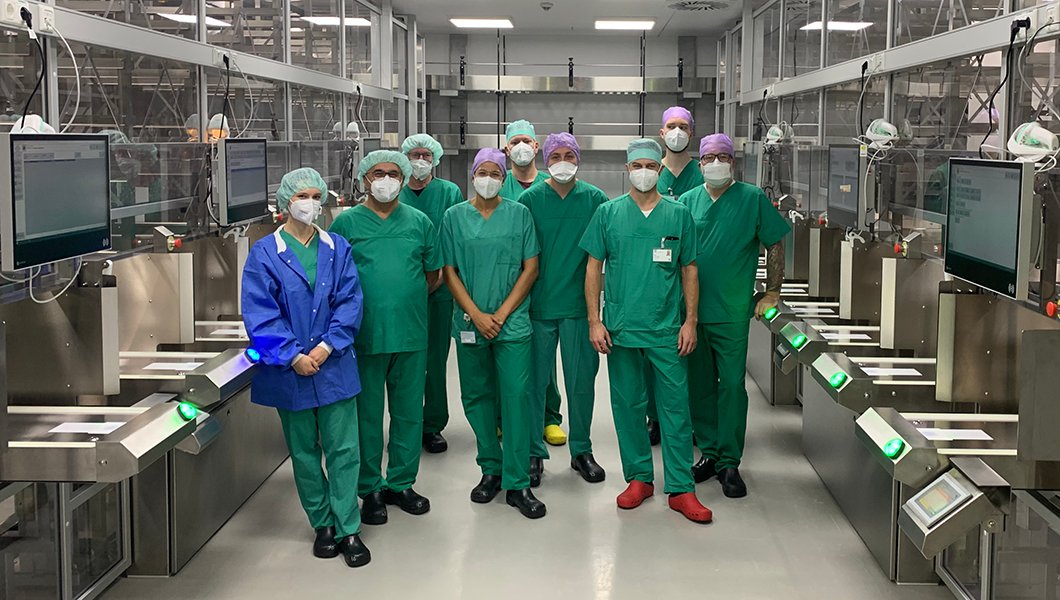There were representatives from both Universitätsklinikum Schleswig-Holstein, ASANUS Medizintechnik and Gibotech when the SAT (Site Acceptance Test) was held at the Central Sterile Supply Department on Campus Kiel.
An hour south of the Danish-German border, the Universitätsklinikum Schleswig-Holstein has two hospitals in Kiel and Lübeck respectively. And both hospitals have had their Central Sterile Supply Departments automated with the help of Gibotech over the past year.
“The automated CSSD and casecart storage from Gibotech has several advantages for us: The physical workload for our employees is reduced because we have removed some of the heavy, physical tasks, the full traceability of the materials is ensured, and the storage is utilized even better when it is automated. Even though it is a “chaos storage”.” Joss Giese, OP-manager at the Universitätsklinikum Schleswig-Holstein
The Central Sterile Supply Departments in Kiel and Lübeck are semi-automated, which in this case means that Gibotech’s equipment is in the clean and sterile area. AGVs provide transportation between the workstations, and conveyors and shuttles ensure order in the storage, where the sterile equipment is stored until it is used for an operation.
Robot relieves heavy work
The surgical equipment is packed in wire baskets. Depending on the type of equipment and operation, the baskets have different sizes and weights. And when they are to be stacked, the heaviest must of course be at the bottom. The baskets can be heavy to lift, and stacking them in more or less high stacks can be taxing on the shoulders. Therefore, a robot does the job. The robot scans the baskets and then stacks them by weight. There are shelves on which the robot can place the baskets if the order in which the baskets are received does not match the order in the stack.“We are very pleased that we have been allowed to deliver and install Central Sterile Supply Departments at Universitätsklinikum Schleswig-Holstein’s two hospitals. When we talk about automation solutions for the hospital industry – whether it is CSSDs, kitchens or intralogistics – it is, of course, important to us that the solution meets the customer’s requirements. But we must also take the physical framework into account. It has an influence on the capacity of the storage and how it literally must be built. We have been very pleased with the general cooperation with the Universitätsklinikum Schleswig-Holstein on their two CSSDs, and it is fantastic to see the departments in operation. From the start of the project, there has been a great willingness from UKSH to adjust the project to make it more simple to automate.” Thomas Aagesen, project manager at Gibotech
Automation provides benefits for employees
When you automate a hospital department, you systematize the flow and streamline workflows. In addition to the benefits of having recognizable workflows with the right things always happening in the correct order, employees who work in the department also benefit from automation. The employees are exempted from the heavy work, which strains the body and can lead to shorter or longer sick leave. Time is also freed up when, for example, employees do not have to transport equipment between workstations. Instead, they can spend the time on exactly the tasks for which they are employed. In addition, there are indirect effects from the processes not being touched by human hands. For example, better security and minimizing the risk of human error. In return, you get a better working environment and increased efficiency.Sign up for our newsletter
How can you automate in a hospital? Sign up for our newsletter for hospitals and get news and inspiration.Contact us
Address
Datavej 15
5220 Odense SØ
Contact
+ 45 65 95 82 62
gibotech@gibotech.dk
Opening hours
Monday – Thursday: 7.00 – 15.30
Friday: 7.00 – 13.00
